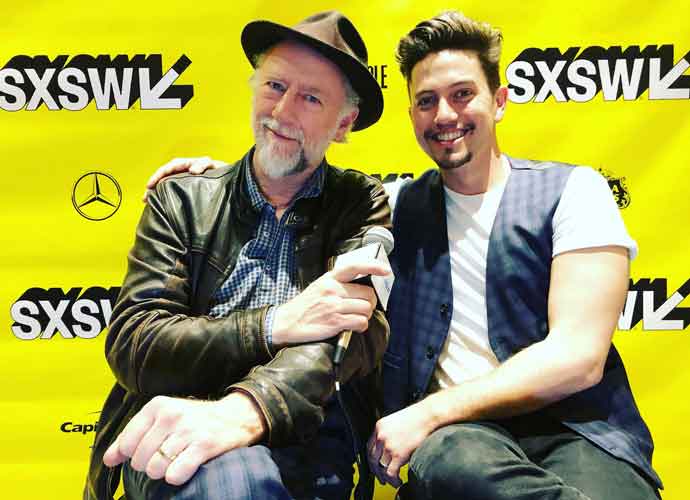SXSW 2019 VIDEO EXCLUSIVE: Jackson Rathbone & Xander Berkeley On ‘The Wall Of Mexico’
Jackson Rathbone and Xander Berkeley, who are known for their roles in Twilight and The Walking Dead, respectively, now star in a drama film called The Wall of Mexico.
The two actors discussed the movie exclusively with uInterview at the South by Southwest (SXSW) festival in Austin, Texas.
GET PAUL McCARTNEY TOUR TICKETS!
Rathbone explained that the film is partly a response to the current political climate and the 2016 election, as its title might evoke. President Donald Trump vowed to build a wall on the U.S.-Mexico border ever since he was a candidate and is still seeking to construct the barrier.
“This is a film about many kinds of walls: physical, metaphysical, emotional, sexual, spiritual, and the divide that they put between us,” Rathbone said. the movie follows a wealthy Mexican-American family who decide to build a wall around their ranch in order to stop townspeople from stealing their well water.
Berkeley added that the “walls” of the movie are also “cultural and generational” in nature.
50 CELEBRITIES WHO DIED IN 2018 – TRIBUTE SLIDESHOW
Rathbone added that the Aristas, the main family in the film, enlist the help of Berkeley’s character Mike — their longtime groundskeeper — to take care of their property. Mike then in turn asks for help from Rathbone’s character, Don.
The Aristas’ two daughters then proceed to torment Don “psycho-sexually,” Rathbone explained.
“They’re very intelligent and hedonistic young ladies,” Rathbone said of those two female characters. “Don’s a very simple guy and he’s drawn to this extravagant life, this luxurious lifestyle.”
Berkeley revealed that he loves how the film “upsets expectations.”
“It leads you down a road, and then it turns out it’s not where you thought you were headed,” he said. “Just to have these archetypically decadent Beverly Hills girls as the Latinas, and then to have them be incredibly sophisticated intellectually upsets so many expectations and yet there they are.”
He continued: “I think the film lets you know right away that you’re not supposed to take it too literally, and that there’s an element of magic and superstition,” he added before saying the whole movie can be interpreted in more than one way.
Rathbone and Berkeley have worked together previously and sarcastically reflected on their friendship.
“We’re like an old married couple that just won’t get divorced because of the kids,” Rathbone joked. “And the kids are our films.”
Rathbone added that ultimately, The Wall of Mexico is a film that draws on themes of cultural differences, socio-economic distinctions, racism and the barriers that these things create. The movie also shows to what length families are willing to go to protect their children.
Berkeley also dissected his character and said that part of what drew him to playing Mike is that he felt the character was both likable because he is self-educated and unlikable because he is a “trickster” and almost a frightening “enigma” in certain ways.
The Wall of Mexico was directed by Zachary Cotler and Magdalena Zyzak and written by Cotler. Esai Morales, Moises Arias and Mariel Hemingway co-star.
Read the full interview transcript below:
Q: What’s the plot of the film?
A: Rathbone: Well we’re here at SXSW with The Wall of Mexico, which is a wonderful movie,
very current in terms of political climate. It’s a direct response to the 2016 political campaign, and now here we are, 2019, our film is out [and] the discourse about the wall is still very much alive. So this is a film about many kind of walls, physical, metaphysical, emotional, sexual, spiritual and the divide [they put] between us.
Berkeley: Generational, cultural [walls], every which way you can divide it. This film talks about the kinds of division which exist and the pain that is caused as a result.
Rathbone: The Wall of Mexico revolves around the wealthy Mexican-American family, the Aristas, and their property which some of the poor locals refer to quite racist-ly as “Mexico.” They hire Mike here, who’s been a groundskeeper there for many years — 35 years, as a matter of fact. Mike actually hires me, young Don, to help him around the Aristas’ property, and the Aristas’ young daughters start tormenting Don psychosexually. They’re very intelligent young ladies, very hedonistic young ladies, and Don [is just a] very simple, simple guy he’s just drawn to this extravagant life,
this luxurious lifestyle. He’s a dope. And I warned him not to fall into that venus flytrap, but his fly came down anyway and came right into it, didn’t it.
Berkeley: Yes sir, it did. You were warned, weren’t you. But the film is also about… I think one of the things I love about is it upsets expectations, that it leads you down a road that then turns out isn’t where you thought you were headed. And just to have these atypically, decadent sort of Beverly
Hills girls as the Latinas and to have them be incredibly sophisticated, intellectually upset so many expectations there. And yet they’re still these hedonists who are still pulling him in, so I think the film right away lets you know that you’re not suppose to take it too literally and that there’s an element of magic and element of superstition. That there’s a part of the film — and you’re open to interpreting it your own way, which is something I love whenever a director doesn’t tell you what to think or what the film is about but leaves it in your lap — and it makes it a little bit more work but so much more rewarding because there’s so much more to talk about and think about afterwards.
Q: How did your previous relationship impact the shoot?
A: Rathbone: We don’t get along at all, it’s very much a dynamic. Why do we keep working
together? Why do we do this to ourselves? Why do I do this? We’re like an old married couple that just won’t get divorced because of the kids, and the kids are our films. We’ve developed a paternal sort of relationship and I love the way you are fathering me.
Berkeley: Exactly.
Rathbone: you need a good father figure, and I’m here for you. In the film, Don — who I play —
and Mike — who Xander plays — they do have this kind of paternal bond. Mike mentors Don and Don really looks up to him as the father figure he never had. For me, playing the character of Don, this is a guy who is so open he never really had anything and he wants to better himself, he wants to be refined, cool like Mike is and live an extravagant and beautiful life like the Aristas, but he is a poorer soul and I think a lot of the aspects of Don as the kind of everyman, is the idea that we all aspire to greatness and we all hope to live a better life for either ourselves or our children. Sometimes, there’s a wall: social, economical, race… and it’s in our way, so for Don to really pursue that dream, it’s a fool’s errand in this film, but he’s gonna pursue it nonetheless.
Berkeley: Mike is much more of a trickster, much more of a coyote kind of archetype in that he is, by all appearances, not taking sides, not revealing if he’s right or left. He’s not revealing whether he’s Christian or not, but he says at one point he believes in everything, and there’s a little bit of magic, aliens, Jesus — you name it, I believe in it. And he’s an enigma, he’s auto-didactical, he educated himself and he is looking out for himself, but you still can’t tell ’till the end what his motives are and why. He does take a liking to Don and that was the hardest part for me, to try and pretend that I like this guy. Even as his character it is… yeesh!
RELATED ARTICLES
Get the most-revealing celebrity conversations with the uInterview podcast!




 Click here for the Victoria’s Secret Fashion Show 2018: Best Photos Slideshow
Click here for the Victoria’s Secret Fashion Show 2018: Best Photos Slideshow




Leave a comment